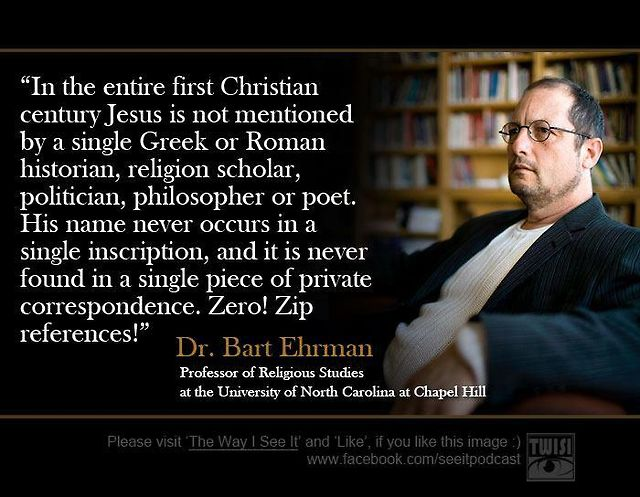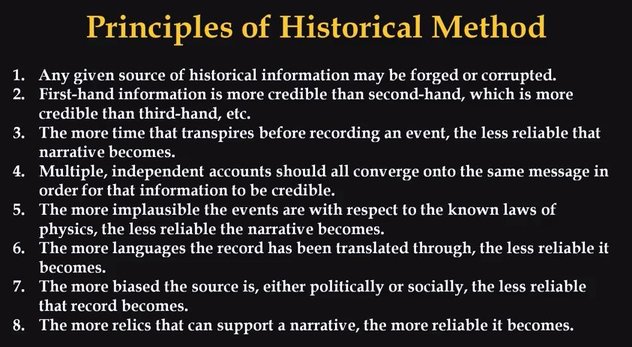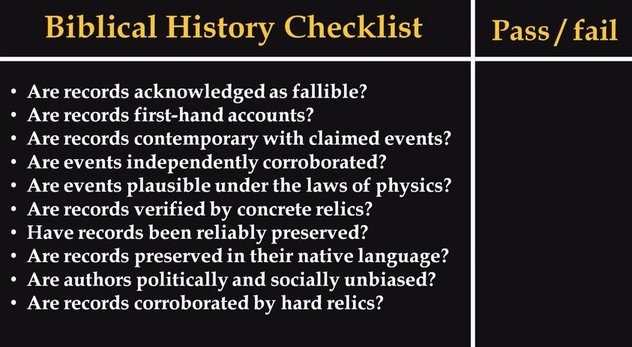

|
Historical Jesus
UPDATE: Several readers have said in the comments that this is a non-issue: why should anyone care whether a historical Jesus existed? I would have thought the answer was obvious, but I'll let Sajanas, who has already commented, give it: But so much of Christian philosophy is based around the argument for authority, that Jesus not existing at all really just crushes it. Then, they're really no more valid than the philosophies of the Iliad or the Aeneid. It's important because one of the major world's religions is based critically on the claim that a historical Jesus existed, which in principle could be supported with evidence. (It's also supported by claims for the divinity of said Jesus.) Sometimes I get the feeling that people just say, "Who cares?" because they have a form of xkcd Syndrome. But millions of Christians do care! For some reason I'm very curious about whether the Jesus myth is based on a historical person. Even if such a person existed, of course, that gives no credence to his status as the divine son of God/part of God, or to the stories about him in the Bible. After all, many myths are based on historical people who are later deemed to have done miracles, been divine, and so on. "John Frum," the iconic figure of the Pacific cargo cults, may well have been based on a real American G.I. Christians, of course, are intensely interested in the historicity of Jesus, for if you can show that such a person existed, it at least gives a boost to their beliefs about his divinity. If, in contrast, there is little or no evidence for a Jesus-person, then the whole myth pretty much collapses, at least if you think Jesus was a real person walking about and doing stuff in Palestine. That's why Christians are obsessed with whatever evidence exists for a historical Jesus, and why Bart Ehrman's books substantiating such historicity are best-sellers. The evidence for a Jesus-person, as we all know (and thanks largely to reader Ben Goren's arguments on this site), is paper-thin. Because of this, scholars debate the issue hotly, with the "mythicists," like Richard Carrier (who thinks that Jesus is not based on a historical person), fighting the "historicists," like Bart Ehrman, who -- while denying the divinity of Jesus -- thinks that the Jesus myth is based on a real apocalyptic preacher who lived at that time. Yet the more I look at the evidence -- and I'm by no means an expert -- the more dubious I become about the evidence for a historical Jesus-person. Yes, one may have existed, but where is the evidence? As far as I can see, it lies solely in scripture: the New Testament. There seem to be no credible extra-scriptural sources attesting to the existence of anyone like Jesus. There are no contemporary accounts of his presence and deeds, though there should have been some given the number of people who were writing then in that area of the Middle East, and the remarkable character of Jesus's deeds. (This includes the earthquakes, renting of the Temple, and arising of zombie saints from their graves during the Crucifixion.) All the accounts come from decades or centuries after Jesus's supposed death, by which time the myths may have begin forming -- and around nobody in particular. In contrast, we have far more historical evidence for the existence of people like, say, Julius Caesar, including contemporary accounts, statues and coins with his image, and contemporary accounts. As far as I can see, then, the "evidence" for a Jesus-person is twofold: first, that he's described in the Bible (but so are Noah and Moses), and second, that people think that myths MUST have accreted around some historical person. The first I find unsatisfying; the second unconvincing. Myths may well have formed around no historical person at all. Was the myth of Paul Bunyan really based on some lumberjack who had a pet ox? Yet it seems churlish -- an offense to Christians -- to doubt that a historical Jesus existed. It's as if by being skeptical about that, you are deliberately trying to tick off Christians. And yet, I think, our doubt is warranted. We should not automatically concede to religionists that Jesus must have existed in some corporeal form, divine or otherwise. This long introduction is to call attention to a new piece at Alternet by Valerie Tarico: "5 reasons to suspect Jesus never existed." (Tarico is described as "a psychologist and writer in Seattle, Washington and the founder of Wisdom Commons. She is the author of "Trusting Doubt: A Former Evangelical Looks at Old Beliefs in a New Light" and "Deas and Other Imaginings." ) Her piece is a short and readable account, which I recommend, and I won't summarize it except to give the five points that Tarico discusses in detail.
She also includes a quote from Bart Ehrman, who, curiously, thinks a historical Jesus did exist: "What sorts of things do pagan authors from the time of Jesus have to say about him? Nothing. As odd as it may seem, there is no mention of Jesus at all by any of his pagan contemporaries. There are no birth records, no trial transcripts, no death certificates; there are no expressions of interest, no heated slanders, no passing references -- nothing. In fact, if we broaden our field of concern to the years after his death -- even if we include the entire first century of the Common Era -- there is not so much as a solitary reference to Jesus in any non-Christian, non-Jewish source of any kind. I should stress that we do have a large number of documents from the time -- the writings of poets, philosophers, historians, scientists, and government officials, for example, not to mention the large collection of surviving inscriptions on stone and private letters and legal documents on papyrus. In none of this vast array of surviving writings is Jesus' name ever so much as mentioned." (pp. 56-57 of Jesus: Apocalyptic Prophet of the New Millennium) Yet if that's a real quote from Ehrman, and not taken out of context, why does he claim with such assurance that a historical Jesus existed? h/t: Barry~
|

|
Why We Might Have Reason for Doubt: Should We Still Be Looking for a Historical
Jesus?
A superbly qualified scholar will insist some piece of evidence exists, or does not exist, and I am surprised that I have to show them the contrary. And always this phantom evidence (or an assurance of its absence) is in defense of the historicity of Jesus. This should teach us how important it is to stop repeating the phrase "the overwhelming consensus says..." Because that consensus is based on false beliefs and assumptions, a lot of them inherited unknowingly from past Christian faith assumptions in reading or discussing the evidence, which even secular scholars failed to check before simply repeating them as certainly the truth. See Also: On the Historicity of Jesus: Why We Might Have Reason for Doubt (Sheffield-Phoenix, 2014). By Richard Carrier, Ph.D. Independent Scholar www.richardcarrier.info August 2014 Last year I had an erudite and friendly debate on London radio with an excellent and well-respected professor of New Testament studies, in which he claimed that in 1 Corinthians 15, the Apostle Paul wrote that he received the gospel he summarizes there "from those who were in Christ before him." Indeed this professor insisted that "from those who were in Christ before him" was in the text. This was perplexing, because I knew that wasn't the case. In fact, quite the opposite. Paul rather conspicuously never says this in any of his letters. He even explicitly denies it in one (Galatians 1). My opponent was a bit nonplussed when we looked at the text, and to his astonishment, the phrase he was sure was there, was not. This is not an isolated story. This has happened to me countless times. A superbly qualified scholar will insist some piece of evidence exists, or does not exist, and I am surprised that I have to show them the contrary. And always this phantom evidence (or an assurance of its absence) is in defense of the historicity of Jesus. This should teach us how important it is to stop repeating the phrase "the overwhelming consensus says..." Because that consensus is based on false beliefs and assumptions, a lot of them inherited unknowingly from past Christian faith assumptions in reading or discussing the evidence, which even secular scholars failed to check before simply repeating them as certainly the truth. It's time to rethink our assumptions, and look at the evidence anew. There are at least six well-qualified experts, including two sitting professors, two retired professors, and two independent scholars with Ph.D.'s in relevant fields, who have recently gone on public record as doubting whether there really was a historical Jesus. I am one of them.[1] And I have recently published the first-ever peer reviewed academic study making the case for this conclusion. On the Historicity of Jesus: Why We Might Have Reason for Doubt was published this year by the University of Sheffield (Sheffield-Phoenix, 2014). It continues the case I began in a prior peer-reviewed book, Proving History: Bayes's Theorem and the Quest for the Historical Jesus (Prometheus Books, 2012), on why the methods employed in Jesus studies today are not logically valid, and what must replace them.[2] Of course overthrowing centuries of assumptions cannot be done in a mere two thousand words. Hence the book. But I can here summarize the reasons for suspecting we've been wrong all along about how the Christian religion began. Objections one might then raise are of course answered in my book. Meanwhile, as Philip Davies recently said, "a recognition that [Jesus's] existence is not entirely certain would nudge Jesus scholarship towards academic respectability."[3] I think it is more likely that Jesus began in the Christian mind as a celestial being (like an archangel), believed or claimed to be revealing divine truths through revelations (and, by bending the ear of prophets in previous eras, through hidden messages planted in scripture). Christianity thus began the same way Islam and Mormonism did: by their principe apostles (Mohammed and Joseph Smith) claiming to have received visions from their religion's "actual" teacher and founder, in each case an angel (Gabriel dictated the Koran, Moroni provided the Book of Mormon). On this model, Christianity, as a Jewish sect, began when someone (most likely Cephas, perhaps backed by his closest devotees) claimed this "Jesus" had at last revealed that he had tricked the Devil by becoming incarnate and being crucified by the Devil (in the region of the heavens ruled by Devil), thereby atoning for all of Israel's sins, so the Jerusalem temple cult no longer mattered, the sins of Israel could no longer hold back God's promise, and the end of the world could soon begin. On this theory, Christians did not go looking for proof-texts after their charismatic leader died, but actually conjured this angelic being's salvific story from a pesher-like reading of scripture, finding clues to the whole thing especially in the conjunction of Daniel 9, Jeremiah 23 & 25, Isaiah 52-53, and Zechariah 3 & 6. Because it solved a major theological and political problem of the time: how the world could be saved when God's temple (and thus atonement for Israel's sins) remained in the hands of a corrupt elite "obviously" rejected by God. It would be several decades later when subsequent members of this cult, after the world had not yet ended as claimed, started allegorizing the gospel of this angelic being by placing him in earth history as a divine man, as a commentary on the gospel and its relation to society and the Christian mission. The same had already been done to other celestial gods and heroes, who were being transported into earth history all over the Greco-Roman world, a process now called Euhemerization, after the author Euhemerus, who began the trend in the 4th century B.C. by converting the celestial Zeus and Uranus into ordinary human kings and placing them in past earth history, claiming they were "later" deified (in a book ironically titled Sacred Scripture). Other gods then underwent the same transformation, from Romulus (originally the celestial deity Quirinus) to Osiris (originally the heavenly lord whom pharaohs claimed to resemble, he was eventually transformed into a historical pharaoh himself). Contrary to an oft-repeated myth in contemporary scholarship, before Christianity began both Romulus and Osiris were believed by their devotees to be slain deities subsequently resurrected to heavenly glory (as were many others of the type, from Zalmoxis to Dionysus to Adonis to Inanna), who now could bring glory or salvation to their followers.[4] Of these Osiris presents the most apt theological parallel: as Plutarch explains in his treatise on the cult, in public stories Osiris was placed in history as a historical king subsequently deified, but in private exegesis these were explained as allegories for the actual truth of the matter, which was that each year Osiris descends and becomes incarnate and is slain not on earth, but in the lower heavens, and then rises from the dead and reascends to power in the upper heavens, having gained power over death by this cosmic ritual, which he then shares with his earthly devotees. In the earliest redaction we can reconstruct of the Ascension of Isaiah this appears to be exactly what was imagined to happen for Jesus, only once for all, not yearly.[5] On this theory, when Paul says "the scriptures" tell us that Jesus "died" and "was buried" and only then was he ever "seen" by Cephas and the apostles (1 Cor. 15:3-5), he means exactly what he says. Just as in this and all other summaries of the gospel Paul provides (from here to Philippians 2) there is no mention of a ministry, or of Jesus being seen by anyone (much less anyone taught and hand-picked by him in life), because these things did not yet exist in Christian conception. They would be allegorical fictions contrived later by the authors of the Gospels. When Paul wrote, the death and burial of Jesus were known only from hidden messages in scripture, just as Romans 16:25-26 says. And this knowledge was facilitated by this Jesus then at last appearing to the apostles to inform them of all this, and what it meant. In fact, being thus visited by the celestial Christ is what secured one's status as an apostle (1 Cor. 9:1; Gal 1:11-12). Just as Satan was declared the Archon "of the powers of the air" (Eph. 2:2) and the God "of this Age" (2 Cor. 4:4), so when Jesus is said to have been crucified by the "Archons of this Age" (1 Cor. 2:8), we might be seeing what would later be described in the earliest redaction of the Ascension of Isaiah: a reference to Satan and his demons crucifying Jesus, not the Jews and Romans. And just as Adam was in some accounts buried in the heavens (as in chapter 40 of the Greek text of the Life of Adam and Eve), so possibly was Jesus imagined to have been. The incarnation, in a body of Davidic flesh, still would have been imagined as necessary to fulfill scripture. But as depicted in the Ascension of Isaiah, this would have happened in "the sky." This "Jesus" would most likely have been the same archangel identified by Philo of Alexandria as already extant in Jewish theology.[6] Philo knew this figure by all of the attributes Paul already knew Jesus by: the firstborn son of God (Rom. 8:29), the celestial "image of God" (2 Cor. 4:4), and God's agent of creation (1 Cor. 8:6). He was also God's celestial high priest (Heb. 2:17, 4:14, etc.) and God's "Logos." And Philo says this being was identified as the figure named "Jesus" in Zechariah 6. So it would appear that already before Christianity there were Jews aware of a celestial being named Jesus who had all of the attributes the earliest Christians were associating with their celestial being named Jesus. They therefore had no need of a historical man named Jesus. All they needed was to imagine this celestial Jesus undergoing a heavenly incarnation and atoning death, in order to accomplish soteriologically what they needed, in order to no longer rely upon the Jewish temple authorities for their salvation.[7] Such is the theory. Why might we conclude it's the more likely explanation? Because the sequence of evidence aligns with it. As Bart Ehrman himself has recently confessed, the earliest documentation we have shows Christians regarded Jesus to be a pre-existent celestial angelic being.[8] Though Ehrman struggles to try and insist this is not how the cult began, it is hard to see the evidence any other way, once we abandon Christian faith assumptions about how to read the texts. The earliest Epistles only ever refer to Jesus as a celestial being revealing truths through visions and messages in scripture. There are no references in them to Jesus preaching (other than from heaven), or being a preacher, having a ministry, performing miracles, or choosing or having disciples, or communicating by any means other than revelation and scripture, or ever even being on earth. This is completely reversed in the Gospels. Which were written decades later, and are manifestly fictional. Yet all subsequent historicity claims, in all subsequent texts, are based on those Gospels. We also have to remember that all other evidence from the first eighty years of Christianity's development was conveniently not preserved (not even in quotation or refutation). While a great deal more evidence was forged in its place: we know of over forty Gospels, half a dozen Acts, scores of fake Epistles, wild legends, and doctored passages. Thus, the evidence has passed through a very pervasive and destructive filter favoring the views of the later Church, in which it was vitally necessary to salvation to insist that Jesus was a historical man who really was crucified by Pontius Pilate (as we find obsessively insisted upon in the letters of Ignatius). Thus to uncover the truth of how the cult began, we have to look for clues, and not just gullibly trust the literary productions of the second century. Jesus belongs to a fraternity of worshipped demigods peculiar to the Greco-Roman era and region. All were "savior gods" (literally so called). They were all the "son" of God (occasionally his "daughter"). They all undergo a "passion" (literally the same word in the Greek, patheon), which was some suffering or struggle (sometimes even resulting in death), through which they all obtain victory over death, which they share in some fashion with their followers. They all had stories about them set in human history on earth. Yet none of them ever actually existed. Jesus can be shown to belong to several other typically mythical classes of person as well, unlike almost every other figure of antiquity (even the greatest of emperors and kings).[9] These people were, more often than not, not historical. Yet all were depicted as such in stories written by their believers. We cannot therefore simply declare Jesus the unusual exception. We need a reason. We need evidence. And when we look for it, it dissolves. No evidence outside the Bible can be shown to be based on anything but the Gospels or Christian testimony derived from the Gospels. And inside the Bible we have (1) forgeries (which, being fake, cannot count as evidence), (2) the earliest Epistles that seem strangely silent or ambiguous as to the earthly existence of Jesus, and (3) the most suspiciously mythical Gospels. Not exactly good evidence to go by. Of course there is much to debate. When Paul twice refers to "Brothers of the Lord," does he mean biological kin, or baptized Christians (who were all Brothers of the Lord: Rom. 8:15-29)? When Paul says Jesus "came to be" (genomenos) from the "sperm of David" does he mean descended from David, or manufactured by God, literally from the sperm of David? When Paul says Jesus "came to be" (genomenos) "from a woman" does he mean literally, or allegorically (as in Gal. 4:24)? When Paul says Jesus was "tempted in every way," does he mean as an ordinary man, or merely resisting the temptation to seize absolute divine power (as in Phil. 2:5-9)? When Paul says Jesus was "declared" the "Son of God in power" from his resurrection, is he referring to a post-hoc rationalization of a cult leader's death, or to God's heavenly re-bestowment of a humbled archangel's prior status? We need to ask these questions. Because the old way of looking at the evidence does not fit so well as has been thought. And even among secular scholars this has until now been driven by Christian faith assumptions, rather than a new and genuinely objective look at what the evidence tells us.[10] When we look instead without those assumptions, that Christianity may have been started by a revealed Jesus rather than a historical Jesus is corroborated by at least three things: the sequence of evidence shows precisely that development (from celestial, revealed Jesus in the Epistles, to a historical ministry in the Gospels decades later), all similar savior cults from the period have the same backstory (a cosmic savior, later historicized), and the original Christian Jesus (in the Epistles of Paul) sounds exactly like the Jewish archangel Jesus, who certainly did not exist. So when it comes to a historical Jesus, maybe we no longer need that hypothesis.
|




|
No one has the slightest physical evidence to support a historical Jesus; no artifacts, dwelling, works of carpentry, or self-written manuscripts. All claims about Jesus derive from writings of other people. There occurs no contemporary Roman record that shows Pontius Pilate executing a man named Jesus. Devastating to historians, there occurs not a single contemporary writing that mentions Jesus. All documents about Jesus came well after the life of the alleged Jesus from either: unknown authors, people who had never met an earthly Jesus, or from fraudulent, mythical or allegorical writings. Although one can argue that many of these writings come from fraud or interpolations, I will use the information and dates to show that even if these sources did not come from interpolations, they could still not serve as reliable evidence for a historical Jesus, simply because all sources about Jesus derive from hearsay accounts. Hearsay means information derived from other people rather than on a witness' own knowledge. Courts of law do not generally allow hearsay as testimony, and nor does honest modern scholarship. Hearsay provides no proof or good evidence, and therefore, we should dismiss it. The Anno Domini (AD) and Before Christ (BC) dating system was devised in 525 AD but not widely used until after 800 AD. The entire dating system and historical birthdate of Jesus was based from biblical quotations The historian Titus Flavius Josephus wrote about Jesus but that was around 93-94 AD. What is written of Jesus, is the story of his birth, then 13 years go by before he shows up in a temple for a short visit, followed by another 18 year absense before his ministry and the miracles occur, one or two years before his crucifixion. There are no tales of his schooling, who his friends were, no tales of birthday parties, or whether he had any girlfriends and whether he ever had sex. No one seems to have documented that he died a sexual virgin. The most often cited proof is a letter from a Roman historian named Flavius Josephus mentioning Jesus, however, historical research has shown that the mention of Jesus is a forgery that was inserted into the original letter. There is no plausible evidence or proof that Jesus actually existed. There is not a single record of his existence that dates from the time when he supposedly was alive. The gospels of the New Testament were written long after the time in which Jesus supposedly lived. One could argue that lots of people live their lives without ever being mentioned in any written records, and this was more likely in the ancient world than in the modern world, where at least births and deaths are published in newspapers. However, if Jesus was actually an important person (much less a portion of the Holy Trinity) whose actions changed the course of human history, it would seem reasonable that people would have made note of his existence and of the events of his life. The concept of Jesus's divinity was established in the Nicene conference in 320 AD. This explains why the Eastern Orthodox church does not regard Jesus as divine (begotten by God). In fact, the Nicene Creed establishes the concept of the Holy Trinity.

Reason would dictate that if all the miracles which Jesus supposedly performed or surrounded him:
|
|
You can read this book online:
From "The Christ" -- John E. Remsberg The following is a list of writers who lived and wrote during the time, or within a century after the time, that Christ is said to have lived and performed his wonderful works: Josephus, Philo-Judaeus, Seneca, Pliny the Elder, Suetonius, Juvenal, Martial, Persius, Plutarch, Justus of Tiberius, Apollonius, Pliny the Younger, Tacitus, Quintilian, Lucanus, Epictetus, Silius Italicus, Statius, Ptolemy, Hermogones, Valerius Maximus, Arrian, Petronius, Dion Pruseus, Paterculus, Appian, Theon of Smyrna, Phlegon, Pompon Mela, Quintius Curtius, Lucian, Pausanias, Valerius Flaccus, Florus Lucius, Favorinus, Phaedrus, Damis, Aulus Gellius, Columella, Dio Chrysostom, Lysias, Appion of Alexandria. Enough of the writings of the authors named in the foregoing list remains to form a library. Yet in this mass of Jewish and Pagan literature, aside from two forged passages in the works of a Jewish author, and two disputed passages in the works of Roman writers, there is to be found no mention of Jesus Christ. Philo of Alexandria was born before the beginning of the Christian era, and lived until long after the reputed death of Christ. He wrote an account of the Jews covering the entire time that Christ is said to have existed on earth. He was living in or near Jerusalem when Christ's miraculous birth and the Herodian massacre occurred. He was there when Christ made his triumphal entry into Jerusalem. He was there when the crucifixion with its attendant earthquake, supernatural darkness, and resurrection of the dead took place -- when Christ himself rose from the dead, and in the presence of many witnesses ascended into heaven. These marvelous events which must have filled the world with amazement, had they really occurred, were unknown to him. It was Philo who developed the doctrine of the Logos, or Word, and although this Word incarnate dwelt in that very land and in the presence of multitudes revealed himself and demonstrated his divine powers, Philo saw it not.
BTW, there's also nothing about Jesus in the Dead Sea Scrolls -- and there could have been. I'm no historian, so my two cents are probably worthless, but here goes. It is often said that the lack of written evidence for Jesus is not surprising: very few (relatively) written records remain of anyone. That reasoning does sound credible at first. But the way the story is told, Jesus wasn't just another person. This is someone who performed miracles in front of thousands of people, someone who was such a threat to authority he had to be crucified, and Pilate personally got involved. That his crucifixion drew large crowds, and at the moment of his death, the earth trembled and zombies rose from the ground. To reconcile why such events weren't noted, it seems like there are two possible explanations: either it didn't happen (my view), or such things were so common then that they weren't worthy of note. With all the dragons and unicorns running loose, I'd say that zombies were probably pretty low priority.
|
|
There is no contemporary evidence outside the Bible for a historical Jesus. The few mentions he gets elsewhere all date from at least 70 years after when he supposedly died. There are at least two contemporary figures who should/would have been aware of the living Jesus, yet seem not to have been. Philo of Alexandria (c 20 AD - 50 AD), a Jewish historian/philosopher from Alexandria was a grandson of Herod the Great so had access to the highest levels of the Jewish court in Jerusalem. One of his nephews, Tiberius Julius Alexander, was the Roman procurator (governor) of Judea in 46-48, less than two decades after Jesus' death. Philo and Tiberius seem to have been in regular communication as some of Tiberius' letters appear in Philo's works. To thicken the plot further, another nephew, Marcus, was the husband of Bernice, a daughter of Herod Agrippa, grandson of the biblical King Herod. So Philo certainly had the connections that should have made him aware of Jesus. But Philo wrote not a single word about him, Christianity, or of the fate of the Apostles after the death of Jesus. But he did write about other sects active in Judea at the time, including a longish piece about the Essenes. Compare this with the few lines devoted to the Christians written in the century after the time of Jesus. Herod Agrippa supposedly personally killed John's brother James, and persecuted the Church (Acts 12:1-2), and St Peter was supposedly rescued by angels while chained and guarded by four squads of troops in Herod's prison (Acts 12.3-7). You'd think at least the latter would have been talked about within the family. Seems not. OTOH, Philo did write about Pontius Pilate, the only contemporary mention we had until the discovery of the Pilate Stone in 1961. Even more puzzling is that Saul of Tarsus/Paul the Apostle never knew the living Jesus. He was living in Jerusalem during the years Jesus was supposedly stirring up Judea culminating in His death. As the personal student of Gamaliel, a leading Pharisee legal authority in Jerusalem, Saul was well connected in that Jewish sect, supposedly Jesus' sworn enemies and instrumental in His death. Yet he knew nothing of Jesus when he was alive. He only 'met' him in visions on a journey to Damascus. Strange, huh? The earliest written evidence we have for Jesus is the Pauline material written some 30 years after Jesus was supposedly crucified. It isn't really clear whether Paul believes Jesus was ever a flesh and blood man. The Gospels date from much later, 80-110 AD and were clearly not written by anyone who knew Jesus. The authors were almost certainly Greek speaking Syrians with limited knowledge of Galilee and Judea. Those that wrote Mark and Luke appear not even to have been that well acquainted with Judaism. So all in all, not people who you'd think would be reliable historical sources. The thing I find remarkable is how Jesus grows as a man the further the stories about him are written. Paul tells us virtually nothing personal about him. Mark, the oldest Gospel, tells us very little about Jesus prior to His ministry. Nothing about His family, place and circumstances of His birth, etc. It is only with the later Gospels that we start to learn the private details. Which is not the way these things work in real life. Your father could write much more about your paternal grandfather's life, personality and sayings than you can, and you in turn could tell us more about him than your kids will be able to. Your grandkids may not even know his name. Yet the time span between your grandfather and your grandkids will be about the same as that of the death of Jesus and the appearance of the last Gospels. IMHO, while a historical Jesus who lived the life depicted in the Bible, albeit without the supernatural bits, can't be entirely ruled out, the odds that he did exist are vanishingly small.
|
|
This story first appeared at AlterNet.
Most antiquities scholars think that the New Testament gospels are "mythologized history." In other words, they think that around the start of the first century a controversial Jewish rabbi named Yeshua ben Yosef gathered a following and his life and teachings provided the seed that grew into Christianity. At the same time, these scholars acknowledge that many Bible stories like the virgin birth, miracles, resurrection, and women at the tomb borrow and rework mythic themes that were common in the Ancient Near East, much the way that screenwriters base new movies on old familiar tropes or plot elements. In this view, a "historical Jesus" became mythologized. For over 200 years, a wide ranging array of theologians and historians - most of them Christian - analyzed ancient texts, both those that made it into the Bible and those that didn't, in attempts to excavate the man behind the myth. Several current or recent bestsellers take this approach, distilling the scholarship for a popular audience. Familiar titles include Zealot by Reza Aslan and How Jesus Became God by Bart Ehrman. But other scholars believe that the gospel stories are actually "historicized mythology." In this view, those ancient mythic templates are themselves the kernel. They got filled in with names, places and other real world details as early sects of Jesus worship attempted to understand and defend the devotional traditions they had received. The notion that Jesus never existed is a minority position. Of course it is! says David Fitzgerald, author of Nailed: Ten Christian Myths That Show Jesus Never Existed at All . For centuries all serious scholars of Christianity were Christians themselves, and modern secular scholars lean heavily on the groundwork that they laid in collecting, preserving, and analyzing ancient texts. Even today most secular scholars come out of a religious background, and many operate by default under historical presumptions of their former faith. Fitzgerald is an atheist speaker and writer, popular with secular students and community groups. The internet phenom, Zeitgeist the Movie introduced millions to some of the mythic roots of Christianity. But Zeitgeist and similar works contain known errors and oversimplifications that undermine their credibility. Fitzgerald seeks to correct that by giving young people interesting, accessible information that is grounded in accountable scholarship. More academic arguments in support of the Jesus Myth theory can be found in the writings of Richard Carrier and Robert Price. Carrier, who has a Ph.D. in ancient history uses the tools of his trade to show, among other things, how Christianity might have gotten off the ground without a miracle. Price, by contrast, writes from the perspective of a theologian whose biblical scholarship ultimately formed the basis for his skepticism. It is interesting to note that some of the harshest debunkers of fringe Jesus myth theories like those from Zeitgeist or Joseph Atwill (who tries to argue that the Romans invented Jesus) are from serious Mythicists like Fitzgerald, Carrier and Price. The arguments on both sides of this question - mythologized history or historicized mythology - fill volumes, and if anything the debate seems to be heating up rather than resolving. A growing number of scholars are openly questioning or actively arguing against Jesus' historicity. Since many people, both Christian and not, find it surprising that this debate even exists - that credible scholars might think Jesus never existed - here are some of the key points that keep the doubts alive:
For David Fitzgerald, these issues and more lead to a conclusion that he finds inescapable: Jesus appears to be an effect, not a cause, of Christianity. Paul and the rest of the first generation of Christians searched the Septuagint translation of Hebrew scriptures to create a Mystery Faith for the Jews, complete with pagan rituals like a Lord's Supper, Gnostic terms in his letters, and a personal savior god to rival those in their neighbors' longstanding Egyptian, Persian, Hellenistic and Roman traditions. In a soon-to-be-released follow up to Nailed, entitled Jesus: Mything in Action, Fitzgerald argues that the many competing versions proposed by secular scholars are just as problematic as any "Jesus of Faith:" Even if one accepts that there was a real Jesus of Nazareth, the question has little practical meaning: Regardless of whether or not a first century rabbi called Yeshua ben Yosef lived, the "historical Jesus" figures so patiently excavated and re-assembled by secular scholars are themselves fictions. We may never know for certain what put Christian history in motion. Only time (or perhaps time travel) will tell.
Standard reply to a very common repost: We can say for a fact that supernatural miracle worker Jesus did not exist because magic is not real. So what about 'Flesh & Blood Jesus'....? There are few ancient sources on Jesus' life. All surviving mentions of Jesus in ancient times are in texts written decades or more after his supposed death. While later Roman and Jewish sources do mention him, the gospels contradict themselves and each other on the key events. The New Testament is factually incorrect on many historical events, such as the reign of Herod and the Roman census. Therefore, it is not clear whether Jesus was in fact a historical person. Other alleged accounts or claims are fabricated and/or forged or simply plain lies. The most commonly cited are: Pliny the Younger - He mentioned only christians and what they did, never Jesus himself. Simple as that. Tacitus - His 'writings', to whit 'The Annals', which mention Jesus are a known forgery. Primarily, it is known the relevant passage was tampered with. The word 'Chrestian' in the passage was changed to 'Christian' after the fact. Secondary considerations are: The word rendered as "Christus" or "Chrestus" (seemingly based on if the transcriber/translator wants to connect it to Suetonius) is in reality "Chrstus" and the part of the Annals covering the period 29-31 (i.e. the part most likely to discuss Jesus in detail) are missing. Further, two fires had destroyed much in the way of official documents by the time Tacitus wrote his Annals so he could have simply gone to the Chrestians themselves or written to his good friends Plinius the Younger and Suetonius for more on this group and finally, the account is at odds with the Christian accounts in the apocryphal 'Acts of Paul' (c.160 CE) and 'The Acts of Peter' (c.150-200 CE) where the first has Nero reacting to claims of sedition by the group and the other saying that thanks to a vision he left them alone. In fact, the Christians themselves didn't start claiming Nero blamed them for the fire until c.400 CE. Josephus - The 'Antiquities of the Jews' mentions Jesus twice. First is XVIII.3.4 (also known as the Testimonium Flavium) and the second one is in XX.9.1. Again here we can show that the texts have been tampered with. Examples of which include the long time tradition that held that James 'brother of the Lord' died c.69 CE but the James in Josephus died c.62 CE. Further, it was stated that James brother of the Lord' was informed of Peter's death (64 CE or 67 CE) via letter, long after the James in Josephus's writings was dead and gone. Both of which are contradictions. "Even secular historians say...." - Only TWO ostensibly secular historians comprehensively address this issue: Maurice Casey and Bart Ehrman. A problem which even Ehrman himself, despite being firmly in the historical jesus camp, notes as a glaring oddity: "Odd as it may seem, no scholar of the New Testament has ever thought to put together a sustained argument that Jesus must have lived." It can in fact be shown that few theologians are historians (and those who are, are not very good at it) and fewer still are historical anthropologists, those being the two fields critical to the "Did Jesus exist?" question. As is often said the consensus among many (not all) historians is that the historicity of Jesus is true however very few historians have actually studied this question in depth or published peer reviewed papers on the question, rather they are just themselves parroting the consensus that they have been taught; which itself is based entirely on the assumption that many legends have some truth in them so this one must too. Obviously that ignores the fact that not all legends do. Suppose, just for a second, that a dude named Yeshua, who was one itinerant preacher among thousand of others, did exist. What then? What does that prove? There is more to suggest he did not than there is to suggest he did but just because a dude "might have existed" and if so, was seemingly observed roaming the countryside, preaching the splendor of faith in the great architect of the cosmos using vegetables as visual aids, this in no way validates anything that is in the Biblical accounts of the mythic Christ character. It means nothing. It changes nothing. Much less proves their specific deity exists. https://rationalwiki.org/wiki/Evidence_for_the_historical_existence_of_Jesus_Christ I take the Mythicist view anyway. There was no 'man', only a myth. |

Send comments to:
 hjw2001@gmail.com
hjw2001@gmail.com
|




